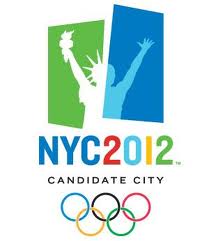Big Apple Summer Games Would Be An Olympic-Sized Mistake

BETWEEN THE LINES: Seven years ago New York City was in the running to host the Summer Olympic Games, which are currently underway 3,500 miles east of here. We made it to the final five before London was selected.
Though I’ve yet to hear about any major problems for the games, with the exception of too many empty seats early on, or hassles getting around London, if the 2012 (pronounced “twenty twelve” — not “two thousand and twelve”) games had been held here, more than likely it would have inconvenienced many city residents. Besides the congestion and the temporary population explosion, the cost to build new or renovate existing venues, including a proposed $2 billion stadium near the Lincoln Tunnel, the plan would have been prohibitive considering the city’s traditionally strained budget.
Initially, the idea of New York hosting the Olympics may have caused more than a few mental somersaults, but while I hate to be an Olympic party pooper, New Yorkers might wanna dwell on the inherent logistical problems if the city were to host a future Olympics.
Drivers and commuters are accustomed to the traffic jams and delays we regularly experience, but if the Olympics were in town for almost three weeks, it might be more sensible to go on vacation for the duration, unless you score tickets for an event or two and make your mind up to deal with the temporary inconveniences.
If New York were to host the Summer Games, it would undoubtedly put the Big Apple center stage. Years before, the millennium crime, drugs and filth were brought under control and began to decrease. The after-effects made New York the world’s preeminent showcase and it has become a top tourist destination for more than a decade. Despite prevailing economic woes, the city’s image may now be at an all-time high. A decade from now travelers will still want to flock here, whether or not we host the Olympics.
Okay, let’s consider what a 17-day Olympics would mean for the average New Yorker. Most people probably wouldn’t attend an Olympic event due, in part, to steep tickets prices and also because of ticket scarcity for top events. And what about the frustration and hassle it would create for those who live and work in the five boroughs?
Traffic gets snarled on an average day, especially if there’s an accident or vehicular breakdown or when the president or some head of state visits, and several Manhattan streets and thoroughfares are closed off to vehicles and pedestrians, triggering slow-moving detours. How about when the Department of Transportation undertakes a key construction project or major roadway repairs?
Keeping things moving smoothly — gridlock free — in this city is routinely a monumental task. Multiply that tenfold and you can envision the resulting Olympic-sized traffic nightmare if the Summer Games were held here, with an influx of thousands of athletes and tourists, not to mention the addition of 24/7 round-the-clock security.
Here’s food for thought: Every year, during the New York City Marathon, getting around the city by car in some neighborhoods is exasperating. Any attempt to drive across the Verrazano Bridge from morning to mid-afternoon results in creeping along for hours at a snail’s pace. And that’s just a one-day event. The Olympics last for 17 days.
What about the detours that would escalate during the construction of Olympic venues? Imagine what getting around would be like in the years leading up to the opening ceremony. Then think about more than two weeks of gridlock. Now that’s an Olympic nightmare!
Sure, on the face of it, hosting the Olympics may seem like a splendid idea, which would attract thousands of free-spending tourists to boost the city’s treasury, businesses and polished image.
But let’s be pragmatic.
Would the money accumulated over a short period offset the costly Olympics preparations? More importantly, would that revenue trickle down to bolster public schools, maintain the infrastructure or other municipal necessities?
A decade ago, New York was among 11 cities that tendered bids to host this year’s games. Some believed, a mere 14 months after 9/11, that lingering international sympathy gave us an advantage. But, the International Olympic Committee (IOC) didn’t make its choice until 2005, so, by then, compassion had weakened. Nonetheless, New York had to prove it was more worthy than such competing cities as Rome, Paris, Moscow, Rio de Janeiro, Istanbul, Johannesburg and, of course, London. Anyway, the IOC is not known for its empathy or compassion, which it plainly demonstrated with its neglect of a meaningful tribute for the 11 Israeli athletes and coaches killed by terrorists during the Munich games 40 years ago.
I’m a native New Yorker. I love this city and I defend it in good times and bad. Nonetheless, before we start dashing, sprinting or jumping to host the international athletic competition, with its inherent inconveniences and disruptions, our anxious public officials and those influential figures eager to welcome the summer games must assure the city’s hardworking taxpayers that most of the logistical hurdles would be successfully cleared. Without such a guarantee, hosting the Summer Games would be an Olympic mistake.
Neil S. Friedman is a veteran reporter and photographer, and spent 15 years as an editor for a Brooklyn weekly newspaper. He also did public relations work for Showtime, The Rolling Stones and Michael Jackson. Friedman contributes a weekly column called “Between the Lines” on life, culture and politics in Sheepshead Bay.
Disclaimer: The above is an opinion column and may not represent the thoughts or position of Sheepshead Bites. Based upon their expertise in their respective fields, our columnists are responsible for fact-checking their own work, and their submissions are edited only for length, grammar and clarity. If you would like to submit an opinion piece or become a regularly featured contributor, please e-mail nberke [at] sheepsheadbites [dot] com.



